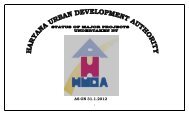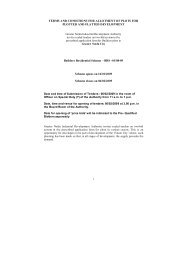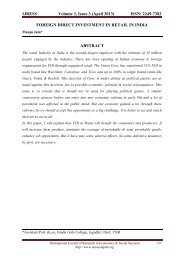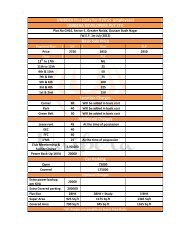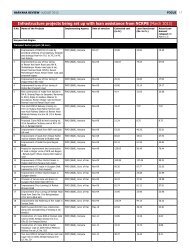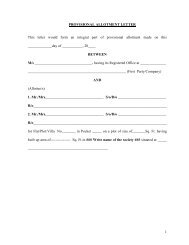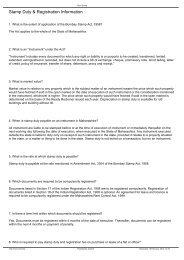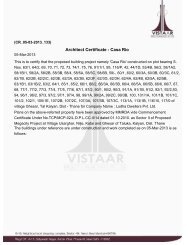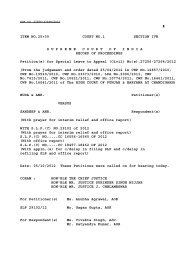JUDGMENT/ORDER IN - WRIT - C No. 37443 of 2011 at <strong>Allahabad</strong> Dated-21.10....http://elegalix.allahabadhighcourt.in/elegalix/WebShow<strong>Judgment</strong>.doPage 104 of 19710/21/201112. That vide lease deed dated 28-07-2010 an area of 106196.00 sq. meter of plot No.GH-01, Techzone-IVGreater Noida is transferred in favour of Respondent No.3 Amarpali Leisure Valley Developers Pvt. Ltd. for thedevelopment and marketing of Group Housing Pockets/flats/plots. A photocopy of the said lease deed dated 28-07-2010 is being filed as ANNEXURE-4 to this writ petition.31. That entire acquisition proceeding in the garb of Planned Industrial Development by respondent no.2 is illegaland against provisions of the Act. The petitioners were under bonafide impression that their land of Village RojaYakubpur will be utilised for Planned Industrial Development by Respondent No.2 but the Respondent No.2illegally transferred the land of petitioners to private builders. The land acquired for Planned IndustrialDevelopment, will be used by respondent No.3 to 8 for illegal gain.32. That when petitioners came to know in the last week of May, 2011 that their land of village Roja Yakubpur willnot be used for Planned Industrial Development, they made frantic efforts to know the details and then they cameacross lease deeds (Annexure- 4 to 9) in favour of respondents No.3 to 8 the land acquired for Planned IndustrialDevelopment was transferred to respondents No.3 to 8 for construction of residential flats and respondent no.2realized huge consideration from respondents no.3 to 8. Thus a little delay has been caused in filing instant writpetition which is neither intentional nor deliberate and as such delay in challenging the notifications U/s. 4 and 6 ofthe Act is liable to be ignored."In Writ Petition No.40356/2011, Satish Kumar Vs. State of U.P. & Ors, petitioner who belongs to VillageGhoribachera has challenged the notifications issued under Section 4 and 6 of the Act,1894 dated 03/10/2005and 05/1/2006. Petitioner in the writ petition has pleaded that although the land was acquired for PlannedIndustrial Development, however 60 percent of the acquired land has neither been developed nor used forindustrial purpose and the land is still in possession of the resident/villagers. Petitioner has also pleaded in thewrit petition that after the publication of the notification in the newspaper, the land owners objected to theacquisition which objections were however not considered and in fact the objections were refused to beentertained on the ground that acquisition is under the provision of urgency clause and the opportunity of hearingshall not be granted. Peaceful demonstration of the villagers have also been referred to on 13/8/2008, which isclaimed to be published in the prominent newspapers. It is useful to quote the pleadings in paragraphs 23 of thewrit petition:-"23. That it is specifically stated here that the Respondent did not pay any heed to the above mentionedobjections, as the Petitioner were neither been called for personal hearing nor any notice has ever been issuedover the above mentioned objections, by the Respondent authorities. It is also worth to mention here that therespondents had even refused to entertain the objections of the residents/villagers of the village Ghori Bacheraafter publication of Sec. 4 of the Act on the Ground that the acquisition Notification, is under the provisions ofurgency clauses of the Act and the opportunity of hearing shall not be granted by the authorities/respondents tothe concern Villagers/land owner/Agriculturist. It is also important to mention here that thevillagers/residents/Agriculturist of the village Ghoribachera had also protested the arbitrary and unlawful acts ofthe respondents by way of peaceful demonstration, which was brutally crushed by the Lathi Charge and evenFiring, resulting into Six killing of innocent farmers as admitted by the respondents and causing bullet injuries tomore than 400 poor Farmers/land owners/demonstrate including the women, children on dated 13.8.2008, thatthis incident has been widely published in the prominent newspapers of the country as well as State of U.P. Thepetitioner reserves his valuable right to produce the relevant documents before this Hon'ble <strong>Court</strong>, during thecourse of hearing of the present writ petition."The substance of the pleadings in different writ petitions is to the effect that the petitioners were under the beliefthat the land is being acquired for Planned Industrial Development which shall serve the public purpose andprovide employment to their children due to establishment of several industries in the area. The land ownersaccepted the same as their fate and did not immediately rush to the court. The reason given by most of thepetitioners for coming to the <strong>Court</strong> is that subsequently when the land was started being transferred to privatebuilders and colonisers it transpired that the land is not being utilised for the purpose for which it was acquiredand instead of industries coming in the area only builders have come up. Petitioners have also pleaded that theauthority has given meagre some of few hundred rupees per square yard to the land owners, but they have beentransferring the land to the builders for hefty amount ranging from Rs. 10,000 to 20,000 per square metre. On theaforesaid ground and other grounds as noticed above, petitioners have approached the <strong>Court</strong> with delay, but thepetitioners case is that since the facts elaborated above indicate that the respondents have played fraud and theacquisition was in colourable exercise of power, the delay in approaching the <strong>Court</strong> may not stand in their way ingranting relief to them for which they are entitled in law. It is also relevant to note that in some of the cases in thisbunch there are cases where the petitioners have immediately rushed to this <strong>Court</strong> and there is no delay in filingthe writ petition for example with regard to Village Patwari which is under challenge, there are some writ petitions
JUDGMENT/ORDER IN - WRIT - C No. 37443 of 2011 at <strong>Allahabad</strong> Dated-21.10....http://elegalix.allahabadhighcourt.in/elegalix/WebShow<strong>Judgment</strong>.doPage 105 of 19710/21/2011which were filed within the reasonable time and there is no delay in such writ petitions at all. For example WritPetition No.62649/2008, Savitri Devi Vs. State of U.P. & Ors, same notifications dated 12/3/2008 and 30/6/2008are under challenge. Similarly, with regard to Village Pali, Writ Petition No.25464/2008, Ghyanendra Singh Vs.State of U.P. & Ors, there is no delay. There are writ petitions of Village Aimnabad i.e. Writ Petition 26162/2008,Shripal Singh & Ors. Vs. State of U.P. & Ors, 26159/2008, Lakhi Ram Vs. State of U.P. & Ors, and writ petition ofVillage Khanpur being 20227/2009, Parag & Anr. Vs. State of U.P. & Ors., which cannot be said to have beenfiled with laches.We have referred to Writ Petition No.5670/2007, Keshari Singh & Anr Vs. State of U.P. & Ors., of VillageYakubpur, in which declaration under Section 6 was issued on 06/1/2007 and the writ petition was filed in theMonth of January, 2007 itself.The issue to be answered is as to whether the writ petitions filed with delay in the facts of the present case be notentertained and be thrown out or the <strong>Court</strong> may consider to examine their grievance on merits inspite of thepetitioners having approached this <strong>Court</strong> with delay. Learned counsel for the parties have referred to variousjudgment of the Apex <strong>Court</strong> and this <strong>Court</strong> in support of their submissions. It is necessary to refer to the principleslaid down by the Apex <strong>Court</strong> in context of entertainment of the writ petitions which have been filed with delay.The first judgment which needs to be considered is the judgement of the Apex <strong>Court</strong> in Moon Mills Ltd Vs. R.Meher, A.I.R 1967 SC 1450, in which the Apex <strong>Court</strong> has reiterated the principle as has been laid down by SirBarnes Peacock in Lindsay Petroleum Company Vs. Prosper Armstrong Hurd, Abraham Farewell, and JohnKemp, (1874) 5 P.C. 221. Following was laid down in para 36 which is quoted below:"36. In the circumstances of this case, we do not consider that there is such acquiescence on the part of theappellant as to disentitle it to a grant of a writ under Art. 226 of the Constitution. It is true that the issue of a writ ofcertiorari is largely a matter of sound discretion. It is also true that the writ will not be granted if there is suchnegligence or omission on the part of the applicant to assert his right as, taken in conjunction with the lapse oftime and other circumstances, causes prejudice to the adverse party. The principle is to a great extent, though notidentical with, similar to the exercise of discretion in the <strong>Court</strong> of Chancery. The principle has been clearly statedby Sir Barnes Peacock in Lindsay Petroleum Co. v. Prosper Armstrong Hurd, Abram Farewell, and John Kemp,(1874) 5 PC 221 at p. 239, as follows:-"Now the doctrine of laches in <strong>Court</strong>s of Equity is not an arbitrary or a technical doctrine. Where it would bepractically unjust to give a remedy, either because the party has, by his conduct, done that which might fairly beregarded as equivalent to a waiver of it, or where by his conduct and neglect he has, though perhaps not waivingthat remedy, yet put the other party in a situation in which it would not be reasonable to place him if the remedywere afterwards to be asserted, in either of these cases, lapse of time and delay are most material. But in everycase, if an argument against relief, which otherwise would be just, is founded upon mere delay, that delay ofcourse not amounting to a bar by any statute of limitations, the validity of that defence must be tried uponprinciples substantially equitable. Two circumstances, always important in such cases, are, the length of the delayand the nature of the acts done during the interval, which might affect either party and cause a balance of justiceor injustice in taking the one course or the other, so far as related to the remedy.""In the present case, we are of opinion that there is no such negligence or laches or acquiescence on the part ofthe appellant as may disentitle it to the grant of a writ."Another judgment which needs to be considered is (1974) 1 SCC 317, Ramchandra Shankar Deodhar & Ors Vs.The State of Maharashtra & Ors (Constitution Bench). Following was laid down in paragraph 10:-"10. It may also be noted that the principle on which the <strong>Court</strong> proceeds in refusing relief to the petitioner onground of laches or delay is that the rights which have accrued to others by reasons of the delay in filing thepetition should not be allowed to be disturbed unless there is reasonable explanation for the delay. This principlewas stated in the following terms by Hidayatullah, C.J. in Tilokchand v. H. B. Munshi (supra):"The party claiming Fundamental Rights must move the <strong>Court</strong> before other rights come into existence. The actionof courts cannot harm innocent parties if their rights emerge by reason of delay on the part of the person movingthe <strong>Court</strong>."Sikri, J., (as he then was), also restated the same principle in equally felicitous language when he said in R. N.Bose v. Union of India: "It Would be unjust to deprive the respondents of the rights which have accrued to them.



